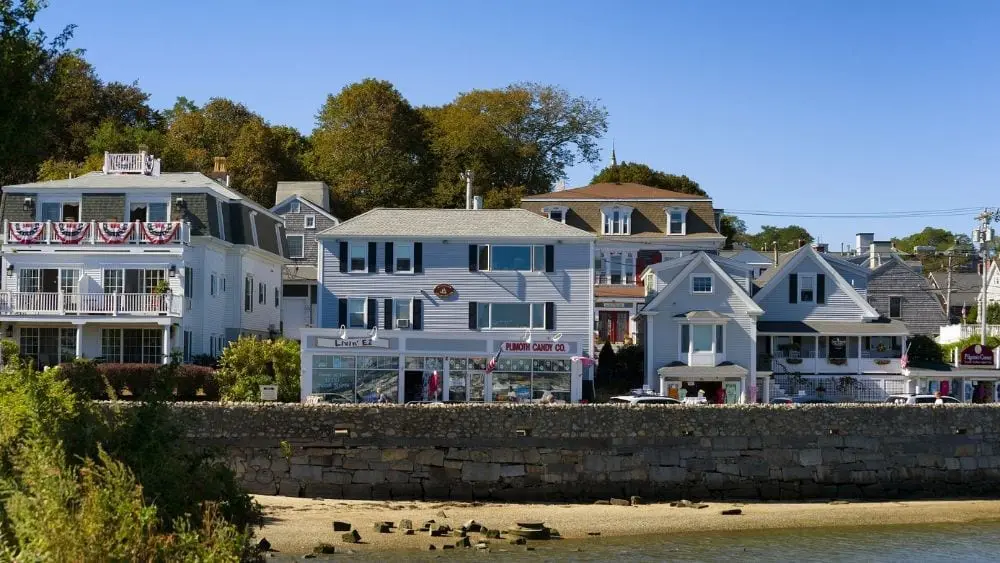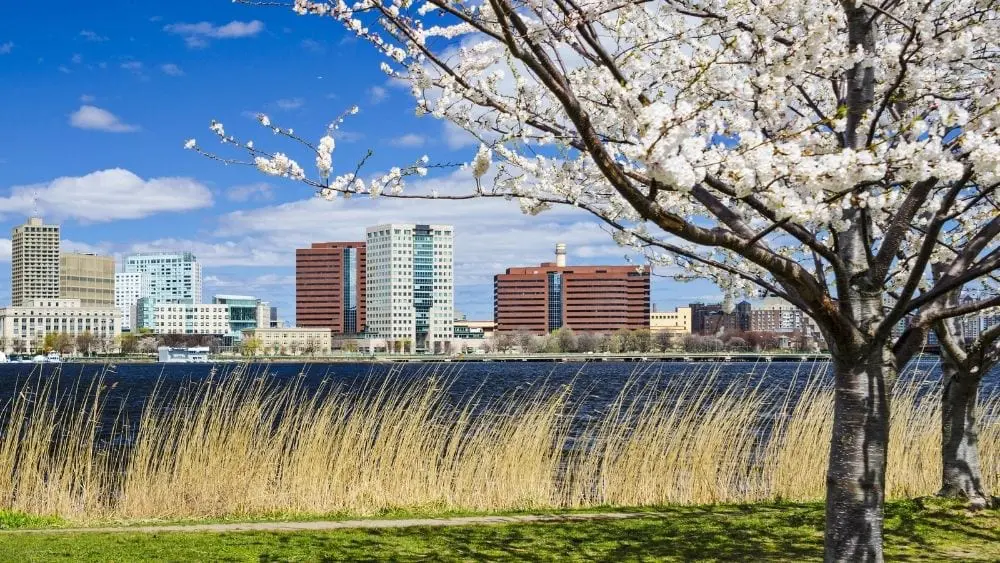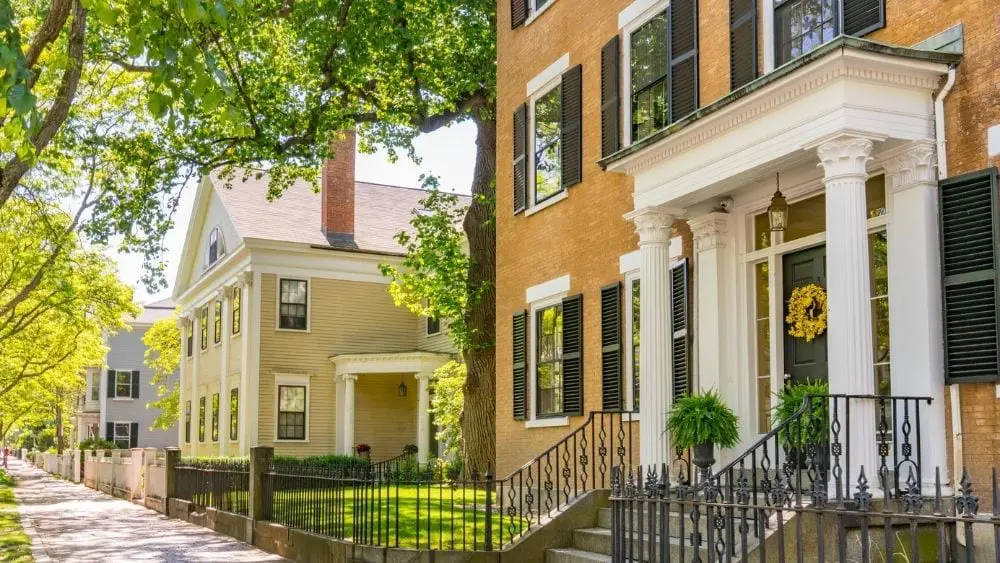
Whether you are a winter sports enthusiast or a history buff, Massachusetts is a wonderful place to build a new home. Known for its seaside cottages and artfully designed city rowhouses, Massachusetts offers a booming economy with new jobs in tech and excellent universities.
Building a new home in Massachusetts takes time and careful planning, but it also tends to be on the more expensive side. According to HomeAdvisor, the average cost to build a home in Massachusetts varies from $250,000 to $600,000, depending on location, size, style of the home, and other factors. The average new construction home in the United States typically costs between $100 and $200 per square foot. Building a new construction home in the Boston area typically ranges from $115 to $400 per square foot with an average of $260 per square foot.
Take the time to prepare a budget and stick to it diligently or risk becoming carried away with expenses. Research market prices for materials, labor, and land in their desired location and keep in mind that the cost to build a home will vary by state based on market costs to transport materials and the regional prices. Your builder or general contractor can advise you on details in your budget as they relate to local market prices as well as the state and local regulations to keep in mind during the process to avoid extraneous fees.
Once you have a number in mind for how much you are willing to spend on your home, take some time to get familiar with the steps to build a new home. From setting the foundation to the final layer of paint, each step is critical to the building process.
If you’re ready to begin mapping out plans for your dream home, here is everything you need to know about building in Massachusetts.
Construction Timeline
In Massachusetts, the time it takes to build a new single-family home is close to the U.S. average of around seven months. Here are the key steps for building a new home in Massachusetts and the primary costs involved. You can also learn about building a modular home in Massachusetts.

Buy Land
Land prices per acre in Massachusetts are among the highest in the nation. According to the U.S. Department of Agriculture, the average cost per acre of farmland in Massachusetts was $13,700 in August 2021, just behind New Jersey ($14,400) and Rhode Island ($16,400).
Thinking of this as a baseline, you should expect residential areas of major cities to cost well above this amount. The rate per acre of land in Massachusetts may be valued significantly higher in metro regions, averaging $102,214 per acre.
Or for example in square footage, the average cost of land for residential use in the Boston area is between $195 and $230 per square foot.
Permits and Paperwork
In Massachusetts, building permits are required for any new construction or renovations that alter, repair, remove, or demolish any part of the structure. Permits are meant to ensure that the structure is built to code and is safe for entry and occupancy. There are penalties and potential fines for homeowners and contractors who begin projects without approval and posted permits, so it’s best to get these filed promptly. Additionally, homes may be more difficult to sell in the future if certain permits are missing by the time it goes to market.
Most permits can be obtained either in person or online with local municipalities. For new buildings, a long-form permit is required. To obtain the permit, homeowners will need to complete a form and submit the construction drawings. A long-form permit costs $50 plus $10 for every $1,000 of work. Permits are valid for six months, so the project must begin within six months after the date of issuance.
Certain renovations may require additional permits down the line, such as replacing the electrical or plumbing, windows, or kitchen cabinets. Fire code permits may also be needed in some cases.
A permit is not needed for minor aesthetic changes such as landscaping, improving the driveway, or installing a six-foot or shorter fence. Building a detached one-story building such as a greenhouse or a shed with a floor area of 120 square feet or smaller also does not require an additional permit at this time.
These are state regulations, but cities and counties may have stricter requirements. Learn more by visiting your city’s website or by going to Mass.gov.

Site Prep
Rural areas that have a lot of freestanding trees or uneven terrain may cost approximately $15 per square foot to clear and prep the land. Take time to consider your site and determine whether any alterations need to be made before developing construction plans. It may be beneficial to hire a land surveyor or engineer to determine the viability of the land for building a home.
Foundation
Some homeowners opt for a monolithic slab foundation that could save up to $10,000 in added costs, but others choose to go with a basement for the extra storage. In some areas where the ground freezes too deep, a slab may not be an option. Consult with your general contractor for requirements and recommendations in your area.
A six-inch reinforced slab on grade foundation costs approximately $8 to $12 per square foot, whereas a basement may cost between $5 and $33 per square foot or more, depending on whether you choose to finish the basement.
Framing
Building a home from scratch involves a framing element that will give the home its true shape and size. Overall, pricing for framing typically runs between $4 and $10 per square foot for labor and another $3 to $6 per square foot for materials. With current supply chain shortages and fewer materials on the market, these numbers may fluctuate quite a bit.
Roof
For a new roof installation, homeowners should expect to pay at least $4.25 to $6.50 per square foot in Massachusetts. In the United States, a roof for a 2,000- to 2,200-square-foot residential home typically costs between $8,500 and $14,300, but the overall cost depends on the quality of labor and availability of materials.
Once the framing and roof are completed and the electrical, plumbing, and HVAC are roughed in, your builder will begin making the house look more like a home. Drywall will be installed, followed by the flooring and interior finishes and fixtures. Exterior finishes and landscaping will then be completed.
Labor
In Massachusetts, homebuilders are not required to have a license to build. Because of this, anyone could decide to become an unlicensed builder and put together their own home, subject to inspection. This may save you money in out-of-pocket labor costs but requires dedication and a huge time commitment, as well as an eye for detail and knowledge of construction processes to deliver a high-quality home product. Consider your time and commitment levels carefully before making this personal decision.
If you choose to hire a general contractor, they will then hire multiple subcontractors and laborers to oversee your home project. A general contractor typically charges about 10 percent to 20 percent or even up to 25 percent of the total project cost.
If you decide not to choose from a premade palette of ready-made home options online, you may need to hire an architect to draw up custom home plans. Architects and designs tend to make up about 12 percent of the construction budget and may cost between $55.00 and $101.67 per hour in Massachusetts.
Most of the construction team will be hired by the general contractor at each stage in the building process. Optional additions for expertise include hiring an interior designer or a landscape artist.

Tips for Building in Massachusetts
Finally, here are a few noteworthy items to be aware of before building your dream home in Massachusetts.
Climate Considerations
New England has a bit of a reputation when it comes to frosty winters. You should expect cold, snowy seasons with abundant precipitation throughout Massachusetts. Adding extra insulation and weatherproofing your home will be essential to protect it from the elements during the cold months. It’s a good idea to perform regular maintenance checks on heating systems and plumbing to ensure that everything is functioning smoothly and efficiently before freezing temperatures set in each year.
Massachusetts experiences all four seasons in a humid, continental climate. Warm summers balance out the chill of the winter. Nearer to the coast, temperatures rise slightly above the cooler breezes found in the Berkshires year-round.
Net-Zero Homes
Massachusetts is paving the way for energy efficiency by incentivizing homeowners to work toward a net-zero home. If you’re looking to build in the next year or two, be aware of potential legislation that incentivizes builders to choose electric heat pumps instead of gas. Homes qualify for incentives at the federal and/or state level if they achieve a HERS score at or below 55. If the bill goes into effect, performance standards for single-family homes will be tightened as the push for electric options in new construction increases.
Builders are predicting that this will have an immediate costly effect on the price of new construction homes in a current housing crisis while climate experts say that the cost will even out over time as the new homes offer next-level sustainability for decades to come.
Closing Cost Incentives
Most states and some local governments offer closing cost incentives and assistance with down payments for new and repeat buyers. For more information regarding Massachusetts’ programs, go online to check out what financial assistance programs are available for new homeowners in the state.
Build Your Massachusetts Home
From the serene rocky beaches to the bustling New England towns, there is so much to love about Massachusetts. If you’re ready to make your next move and start your homeownership journey, now is a great time to take a few of these tips and get started on your new home.

Melanie Theriault is a writer, counselor, and lifelong learner. She holds a B.A. in Sociology from Southwestern University, where she discovered her passion for fostering human connection through storytelling.
 Step-by-Step Guide to Building a Home in Wisconsin
Step-by-Step Guide to Building a Home in Wisconsin